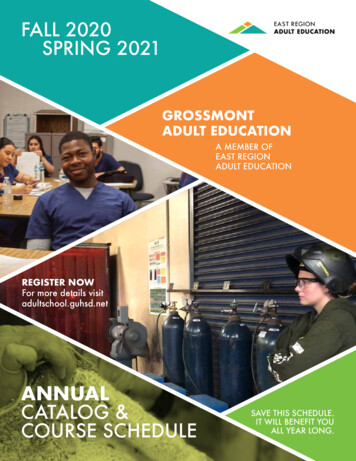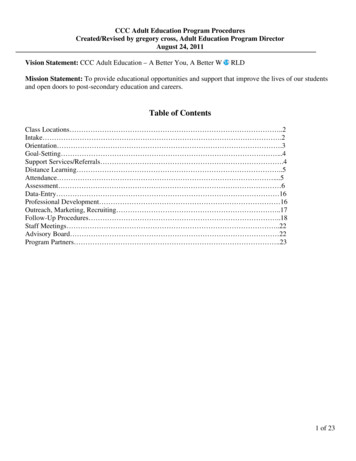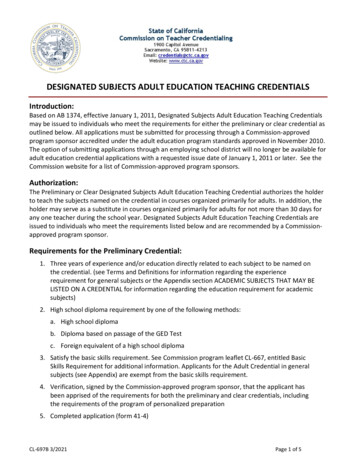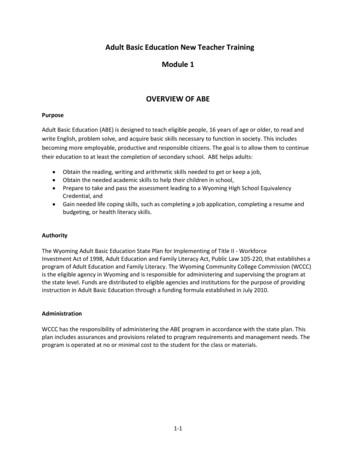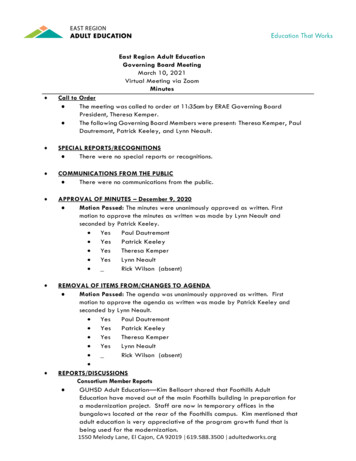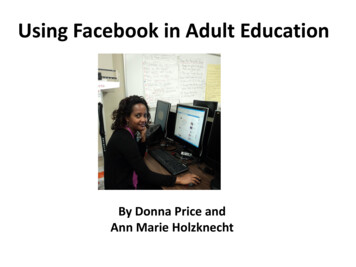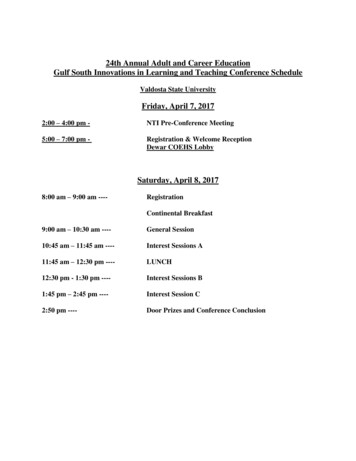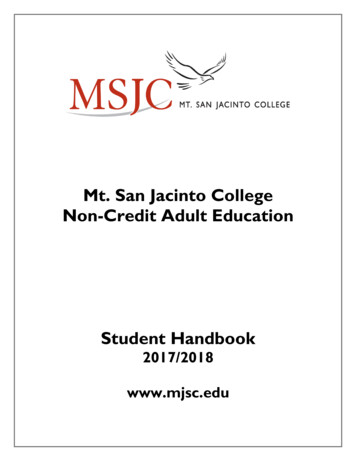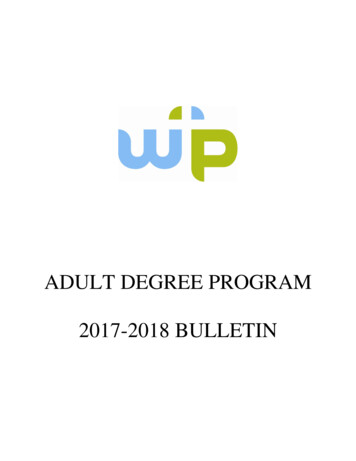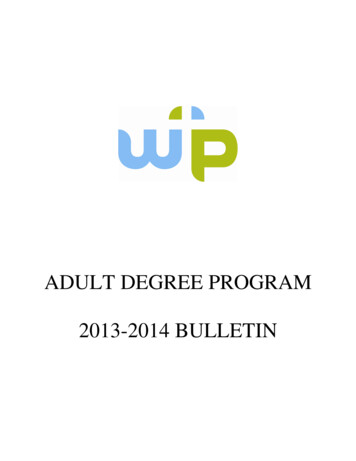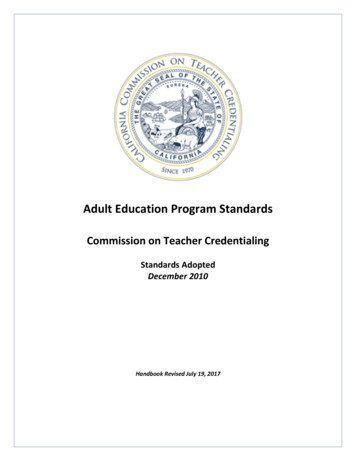
Transcription
Adult Education Program StandardsCommission on Teacher CredentialingStandards AdoptedDecember 2010Handbook Revised July 19, 2017
This handbook, like other publications of the Commission on Teacher Credentialing, is not copyrighted.It may be reproduced in the public interest, but proper attribution is requested.Commission on Teacher Credentialing1900 Capitol AvenueSacramento, California 95811This handbook is available at:http://www.ctc.ca.gov/
Commission on Teacher CredentialingState of CaliforniaArnold Schwarzenegger, GovernorMembers of the CommissionTing Sun, ChairFaculty RepresentativeCharles Gahagan, Vice ChairTeacher RepresentativeConstance Baumgardt BlackburnTeacher RepresentativeBrenda-Victoria CastilloPublic RepresentativeDan ChernowPublic RepresentativeSteven DeanTeacher RepresentativeMarlon EvansPublic RepresentativeLeslie LittmanDesignee, Superintendent of Public InstructionCarolyn McInerneySchool Board MemberShane P. MartinEx-Officio Representative, Association of IndependentCalifornia Colleges and UniversitiesIrene Oropeza-EnriquezAdministrative Services RepresentativeJanis PerryEx-Officio Representative, California PostsecondaryEducation CommissionTine SloanEx-Officio Representative, University of CaliforniaBeverly YoungEx-Officio Representative, California State UniversityExecutive OfficerDale A. JanssenExecutive DirectorCommission on Teacher CredentialingAdult Education Program StandardsiHandbook RevisedJuly, 2017
The Committee on Accreditation2008Joyce AbramsBTSA Support ProviderChula Vista Elementary SchoolChula Vista Elementary School DistrictJoseph JimenezBTSA Induction Cluster Region DirectorTulare County Office of EducationSally PlickaBTSA Program DirectorDavis Joint Unified School DistrictKiran KumarTeacherPomona Unified School DistrictEllen Curtis-PierceAssociate Vice Chancellor for ProfessionalAccreditation and Faculty DevelopmentChapman University CollegeReyes QuezadaProfessor of EducationUniversity of San DiegoIris RiggsProfessorCalifornia State University, San BernardinoAnne JonesDirector, Teacher Education ProgramsUniversity of California, RiversideGary KinseyAssociate DeanCollege of EducationCal Poly Pomona UniversityPia WongAssociate Dean, College of EducationCalifornia University, RiversideCarol LeightySuperintendentTemecula Valley Unified School DistrictNancy WatkinsTeacherValencia High SchoolWilliam S. Hart Union High School DistrictCommittee Support Staff (Commission on Teacher Credentialing)Teri Clark, Acting Director, Professional Services DivisionCheryl Hickey, Administrator of Accreditation, Professional Services DivisionHelen Hawley, Consultant, Professional Services DivisionCommission on Teacher CredentialingAdult Education Program StandardsiiHandbook RevisedJuly, 2017
Advisory Panel forAdult Education TeachersRocky BettarDirector of Adult Education ServicesRowland Unified School DistrictMike BrunelleDirector—Career and Technical Preparation DepartmentSacramento City Unified School DistrictGlenn CaseyCalifornia Polytechnic University, San Luis ObispoAssociate Dean of EducationCrystal GipsConsultantCalifornia State University Chancellor’s OfficeJohn GrisafeAdult Education AdministratorOxnard Adult SchoolBob HarperAdult Education AdministratorSalinas Union High School DistrictCris JohnsonAdult EducatorCalifornia Teachers AssociationErnest KettenringAdult EducatorCalifornia Federation of TeachersMargaret KirkpatrickAdult Education Program DirectorUniversity of California, BerkeleyJohn LusterTeacher EducatorNational UniversityCommission on Teacher CredentialingAdult Education Program StandardsiiiHandbook RevisedJuly, 2017
John MendozaDirector, Adult EducationRedlands Unified School DistrictVicki PraterAdult Education ConsultantCalifornia Department of EducationMary PratherAdult Education AdministratorAssociation of California School AdministratorsRebecca SeherAdult Education DirectorLos Angeles County Office of EducationKathy ThompsonAdult EducatorCalifornia School Boards AssociationDavid WilliamsAdult Education AdministratorBeaumont Adult SchoolSusan YamateAdult Teacher EducatorSan Diego County Office of EducationCommission on Teacher CredentialingAdult Education Program StandardsivHandbook RevisedJuly, 2017
Standards of Quality and Effectiveness forAdult Education TeachersSection I. General IntroductionTable of ContentsIntroduction . 1The Adult Education Advisory Panel . 1Legislative Changes . 2Implementation of the Adult Education Teacher Preparation Standards . 2Section II. Standards for Adult Education Teacher Preparation ProgramsDefinition of Standards . 4Preconditions and Common Standards . 5Program StandardsCategory I: Program Design, Governance, and QualitiesStandard1 Program Design and Rationale . 7Standard2 Collaboration with Local Educators. 7Standard3 Early Orientation . 8Standard4 Beginning Teacher Support, Supervision and Advisement . 8Category II: Preparation to Teach Curriculum to All Students in California SchoolsStandard5 Foundations . 9Standard6 Adult Learning Theory . 9Standard7 Interpersonal Relationships and the Learning Environment . 9Standard8 Curriculum and Instructional Planning . 10Standard9 Using Education Technology in the Classroom . 10Standard 10 Instructional Practices . 10Standard 11 Assessing Student Learning . 11Standard 12 School and Community Resources . 12Standard 13 Professional Responsibilities . 12Attachment A. AB 1374 . 13Commission on Teacher CredentialingAdult Education Program StandardsvHandbook RevisedJuly, 2017
Section IGeneral IntroductionIntroductionIn 1993 the Commission adopted the first standards for adult education teacher preparation pursuant toadvisory panel recommendations. These standards defined a two-level program of preparation to becompleted over a five year period. In April 2008, the Commission announced the establishment of theAdult Education Advisory Panel to recommend changes that would increase teacher supply, streamlinecredential requirements, and improve the quality of preparation to teach California students. The Panelwas charged to:1. Review and update adult education teacher preparation program standards to be consistentwith current California statutes. Recommend updated standards and program requirements tothe Commission.2. Review adult education credential requirements to determine if they are appropriate to meetthe need for teachers in today’s adult schools. Recommend new or modified requirementswhere necessary.3. Review credential types and authorizations for alignment to the new program standards.Recommend changes to the current types and authorizations consistent with these.The panel completed the revisions of credential requirements and program standards in the winter of2009 and field surveyed their recommendations in the spring of 2010. All standards were found to besomewhat important, important, or essential by more than 75% of the respondents. On November 4,2010, the Commission approved the Designated Subjects Adult Education Standards.The Adult Education Advisory PanelIn April 2008, the Commission directed staff to recruit an expert advisory panel to review and updatethe adult education credential requirements and the Standards of Quality and Effectiveness forDesignated Subjects Adult Education Programs. The Commission solicited the field for applications andpanel members were appointed by the Executive Director. As with all Commission work groups, theCommission selected a diverse representation of experts in the field, including those with expertise inteaching English learners, special education, and career technical education. A panel of seventeenmembers was selected, including representatives from the following stakeholder groups: CaliforniaTeachers Association (CTA), California Federation of Teachers (CFT), California School Boards Association(CSBA), and Association of California Site Administrators (ACSA). In addition, the CSU and UC systemsand the California Department of Education were invited to appoint liaisons to the panel. TheCommission on Teacher Credentialing (CTC) is indebted to all of the education professionals who servedon the CTE Advisory Panel for the successful development of new standards for preparing CareerTechnical Education Teachers. CTC believes strongly that the standards in this handbook will improvethe teaching and learning for students in California's public schools.The Panel began its work in summer 2008 and completed its recommendations for revisions to thecredential requirements and program standards in January 2009. The recommended credential anddraft standards were presented for information to the Commission in March and April 2009, at whichtime the Commission directed staff to conduct a field survey for the recommendations with the purposeof obtaining stakeholder input and to seek appropriate legislative changes for the requirements. TheCommission on Teacher CredentialingAdult Education Program Standards1Handbook RevisedJuly, 2017
results of the field survey were presented to the Commission in the October 2010 agenda item and thenew standards were approved by the Commission on November 4, 2010.Legislative Changes Pertinent to Adult Education Credentials and ProgramsOn July 6, 2010, the Governor signed into law Assembly Bill 1374 (Chap. 36, Stats. 2010), a Commissionsponsored bill to update the Adult Education Credential as recommended by the Adult EducationAdvisory Panel. AB 1274 amended EC §44260 and 44251 related to issuance of adult education teachingcredentials. This bill does not contain an urgency clause and, therefore, is effective on January 1, 2011.The new law did the following: Reduces the term of the preliminary credential from 5 years to 3 years. Moves the U.S. Constitution requirement from the preliminary to the clear credential. Reduces the years of experience required for non-academic subjects from 5 years to 3 years. Deletes section 44260.8 relating to the study of health education and computer technology andinstead incorporates that language into section 44260.3 relating to requirements for the clearcredential. Adds section 44251.2 with language asserting the Commission’s policy of honoring the laws andregulations pertaining to credentials “in force” at the time statute is changed unless specificamendments are made to the contrary (aka, “grandfathering”). This language pertains to allcredentials and is not limited only to Designated Subjects Adult Education credentials.The Certification Division developed additions and amendments to Title 5 regulations (Sections § 80034and 80036) to address the balance of the panel’s recommendations. The regulation changes includedthe following recommendations made by the adult education advisory panel that were not included inAB 1374: Require submission of preliminary and clear adult education teaching credential applicationsthrough Commission-approved program sponsors; Change the ‘non-academic’ area to ‘general subjects’ and include the two new general subjectscategories of Career Technical Education and Personal Development available on the Three-YearPreliminary and Clear Adult Education Teaching Credential issued pursuant to AB 1374; Reduce the number of hours required to equal one year of experience from 1500 to 1000hours; Allow advanced industry certificates to qualify for one year of the three years of experiencerequired to qualify for the Three-Year Preliminary Adult Education Teaching Credential in acareer technical subject area, as determined by a Commission-approved program sponsor; Accept one year of teaching experience earned while holding a general education teachingcredential toward the three years of experience required to qualify for the Three-YearPreliminary Adult Education Teaching Credential in a general subjects area; and Update the criteria to qualify for the academic subject area of English as a Second Language.Implementation Plan for the Designated Subjects Adult Education Credential Program StandardsSubsequent to approval of the new Adult Education Standards, Commission staff began theimplementation process which would take place over two years. The major activities and dates for thestandards implementation are outlined in the chart below.Commission on Teacher CredentialingAdult Education Program Standards2Handbook RevisedJuly, 2017
ActivityAdoption of the proposed standards by the CommissionRelease of an Program Sponsor Alert and technical assistance meetingsregarding submission guidelines, and timelines for program revisions anddocument submission, including the final dates for:(1) programs to be approved under the newly adopted standards and/ordiscontinue courses under the old guidelines; and(2) transitioning candidates from the “old” programs to the “new”programsAdult Education Program Standards Handbook posted to CTC web siteProgram planning and revision activities; document preparation beginsDateNovember 2010January 2011January 2011January 2011 andongoingProcess for review of institutional program documents submitted for approval, January 2011 andincluding training program reviewersongoingCOA approval of revised Adult Education credential programs recommended for May 2011 andapprovalongoingPrograms under old standards may no longer accept new candidatesJanuary 31, 2013 orthe date that thenew program isapprovedPrograms that have not been approved under the new Adult Education (2010) July 1, 2016Standards are no longer approved teacher preparation programsThis Handbook presents the standards that program sponsors will be expected to meet for programapproval. The Commission will accept program submissions on a continual basis beginning February2011.Commission on Teacher CredentialingAdult Education Program Standards3Handbook RevisedJuly, 2017
Definition of StandardsCalifornia state law authorizes the Commission on Teacher Credentialing to set standards andrequirements for preparation of California teachers.StandardsStandards are statements of program quality that must be fulfilled for initial or continued approval ofeducator preparation by the Commission. In each standard, the Commission has described anacceptable level of quality in a significant aspect of educator preparation and authorization. TheCommission determines whether a program satisfies a standard on the basis of an intensive review of allavailable information related to the standard. Experts in the area of the educator preparation willreview proposals.These standards are written in two parts. The first category of standards addresses issues of programdesign, governance, and quality. The second category of standards addresses preparation to teach allstudents in California schools, including candidate outcomes.The standards include several statements that must be addressed for the standard to be met. Theprogram standards specify “what’ the program must do. In your response, the institution must explain“how” it will meet the standards. In writing to these standards, it is important to distinguish betweenthe instruction the program provides and what candidates can demonstrate as a result of theinstruction. Program Planning Prompts follow each program standard to clarify the nature of thestandard and to help programs think about how to address the standard. Candidate outcomes followeach of the candidate competence standards. Programs must describe how each of these outcomes istaught to candidates and assessed.All claims made about meeting the standards should be accompanied by evidence. Evidence that wouldhelp program reviewers understand the structure and quality of the program include programdocuments such as advising forms, announcements, and web pages. Evidence that would help programreviewers understand candidate competence includes course syllabi, assignments, and assessments. Itis important to be specific about the evidence and to provide descriptions of it in narrative responses tothe standards.Commission on Teacher CredentialingAdult Education Program Standards4Handbook RevisedJuly, 2017
PreconditionsPreconditions are requirements that must be met in order for an accrediting association or licensingagency to consider accrediting a program sponsor or approving its programs or schools. Somepreconditions are based on state laws, while other preconditions are established by Commission policy.Institutions are required to submit information related to the Preconditions to the Commission at threepoints in the accreditation system: 1) during year one of the accreditation cycle, 2) during year four ofthe accreditation cycle and 2) upon submitting a new program proposal.There are essentially two kinds of preconditions. The first are the Commission’s ten General InstitutionalPreconditions. These apply to all professional preparation programs—teacher and services credentialpreparation programs. These preconditions do not apply to subject matter programs.The second type of preconditions apply to particular kinds of credential preparation programs. There arefour Program Specific Preconditions that apply to all types of educator preparation programs. Inaddition, there are preconditions for many types of educator preparation programs. All programsponsors must respond to each of the applicable preconditions.Click to the following link to hepreconditions.http://www.ctc.ca.gov/educator-The required Preconditions for the Adult Education Program are: General Preconditions 1-10; ProgramSpecific Preconditions 1-4 and 5-8.Common StandardsThe Common Standards address issues of institutional infrastructure, stability, and processes that aredesigned to ensure that the implementation of all approved programs is successful and meets allstandards. Consequently, there is a single response to the nine Common Standards that reflects theinstitution’s support of each of its educator preparation programs. Institutions are required to submitinformation related to the Common Standards to the Commission at two points in the accreditationsystem: 1) during year 5 of the accreditation cycle- the year before the accreditation site visit; and 2)upon submitting a new program pro
Oxnard Adult School . Bob Harper Adult Education Administrator Salinas Union High School District . Cris Johnson Adult Educator California Teachers Association . Ernest Kettenring Adult Educator California Federation of Teachers . Margaret Kirkpatrick Adult Education Program Director University of Cal
